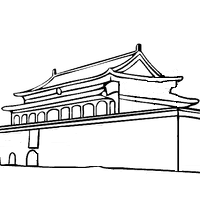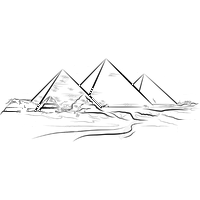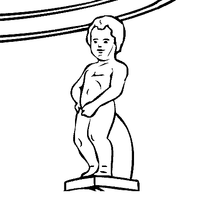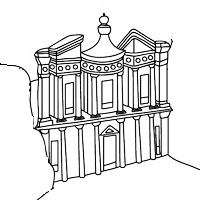The history of Egypt is written on a particularly long time. It must be said that if the country as such exists only for a hundred years, the Egyptian civilization, it appeared since the Neolithic and was structured from 3400 BC. And since Egypt still exists, its history is extremely dense. Hence the interest of detailing it through some major dates.
The rest of this document is therefore a chronology of the history of Egypt through the great dates of its history.
| Periods | Events |
| -6000 | Appearance of the first populations of the Nile Valley |
| -6000 to -3200 | Predynastic period: two centers of civilization develop around Bouto and Hieraconpolis |
| -3200 to -1085 | Pharaonic Egypt |
| -3200 | Leaders (or Narmer), King of the South, unifies Egypt into one kingdom |
| -3200 to -2800 | Thinite period (1st and 2nd dynasty): the beginnings of the pharaonic monarchy |
| -2800 to -2400 | Old Memphite Empire (3rd to 6th Dynasty). Egypt is asserting itself outside its borders. The kings of the Fourth Dynasty built the Great Pyramids of Giza. The end of the 6th dynasty begins the decadence of royal power in favor of nomarchs (birth of feudalism) |
| -2300 to -2050 | First intermediate period (7th to 10th dynasty). The kingdom breaks out in multiple seigniories. Progressive conquest of preponderance by Thebes, which becomes the capital and whose rulers (Montuhotep) reunify the country for their benefit |
| -2050 to -1800 | Middle Theban Empire (11th to 14th Dynasty). Administrative reform under the reign of Sesostris II (around 1950); advent of a less centralized monarchy. Suppression of hereditary functions. Promotion of the middle classes. Enhancement of the country. Expeditions in Nubia and Syria. Egypt's close relations with Palestine and Phenicia. |
| -1800 to -1600 | Second intermediate period (15th to 17th dynasty). Infiltration of Hyksos in the Delta. At Thebes, the Egyptian princes became the vassals of the Hyksos pharaohs, who established their capital at Avaris. Under the 17th Dynasty, the nomarchs of Thebes proclaimed themselves pharaohs and undertook the reconquest of power against the Hyksos |
| -1600 to -1085 | New Theban Empire (17th to 20th Dynasty). Restoration of the Pharaonic monarchy. Main influence of Egypt on Mesopotamia. Nubia becomes an Egyptian province. Tnutmosis III (1490-1436) resumed the policy of conquest and established Egyptian rule even on the Euphrates. Around 1380: Amamian revolution (Akhenaton). Resistance of the clergy of Amon to Thebes. Decline of the Egyptian Empire of Asia. Hittite threat. Under Ramses II (1301-1235), victory against the Hittites in Qadesh, Palestine. From 1230, attacks of the Peoples of the Sea, pushed back in 1191 by Ramses III |
| -1085 to -333 | Low Period |
| Third Intermediate Period (21st to 25th Dynasty) Emigration of power: to Tanis, the kings of the North and, at Thebes, the high priests of Amon + Libyan and Nubian dynasties. Egypt is beset by the great Assyrian conquests. | |
| -660 to -525 | Renaissance saïte. Psammetic I liberated Egypt from the Assyrians in 621 with the help of Greek mercenaries. |
| -605 | Nechao II, allied with the Assyrians, is defeated at Karkemish by Nebuchadnezzar (king of Babylon) |
| -525 | Conquest of Egypt by Cambyse. The Persian kings organize the economic development and exploitation of Egypt and suppress the revolts that erupt from 486 |
| -414 | A new uprising in Egypt ends with the victory of Prince Amyrtée. Egypt regains its independence. |
| -404 to -343 | Last indigenous dynasties (XXVIIe to XXXe) |
| 342 to 333 | The second Persian domination completes the disintegration of the ancient kingdom of the pharaohs |
| -333 to -30 | Hellenistic Egypt. Freed from Persian rule, Egypt becomes part of the Greek empire. |
| -333 | Alexander's arrival in Egypt. He proclaimed himself Pharaoh and founded Alexandria. |
| -323 | At the death of Alexander, Prolemee. son of Lagos, a general of Alexander, is attributed Egypt (beginning of the period called "Ptolemaic"). |
| -305 | Ptolemy founds the dynasty of the Lagides, yes it will know a troubled history, and installs the capital of his kingdom in Alexandria. |
| -66 | Rome claims Egypt |
| -48 | Arrival of Caesar. He installs Cleopatra on the throne of Egypt |
| -36 | Antoine marries Cleopatra. His legions are beaten by those of Octave (battle of Actium in 31). |
| 30 BC to 395 AD | Egypt Roman province |
| Egypt is directly administered by a prefect and becomes the "breadbasket" of Rome. Christianity, to which the majority of the Egyptian population adheres, is being persecuted. | |
| 313 | The edict of Milan proclaims religious freedom. Christian Egypt is torn apart by religious conflicts |
| 395 to 641 | Byzantine Egypt |
| The Roman Empire broke out on the death of Theodosius. Egypt will be permanently attached to the Eastern Empire until the Arab conquest | |
| 641 to 1517 | Muslim Egypt |
| 641 | Conquest of Egypt by 'Amr, lieutenant of Ilmar, second successor of Muhammad. |
| 660 à 750 | Dynasty of the Umayyads. From her capital, Damascus, she extends her empire over Egypt |
| 715 | Arabic becomes the official language of the country |
| 750 to 968 | Dynasty of Abbasids, founded by Abu al-'Abbas and notably marked by the reign of Harun al-Rashid (786 to 803). Baghdad becomes the capital of the Muslim Empire in 762. The temporal power is left to more or less independent local chiefs. |
| 868 to 905 | Dynasty of the Tutunids, who administers Egypt more directly |
| 905 to 969 | Dynasty of Khkhtdides |
| 969 to 1171 | Dynasty of the Fatimids, from the Maghreb |
| 970 | Cairo Foundation |
| 1099 | First Crusade |
| 1171 to 1250 | Ayyubid Dynasty founded by Saladin |
| 1250 to 1516 | Mamluk Dynasty, Cairo becomes the capital of a powerful empire encompassing Syria and Palestine. |
| 1517 to 1914 | Turkish Egypt |
| 1517 | Touman Bey, the last Sultan of the Mamluks, is assassinated by Selim. Egypt becomes a province of the Ottoman Empire |
| 1524 | Suleyman the Magnificent develops a new system of government of Egypt: the country is administered by a pasha foreign to the country and appointed for one year, assisted by 24 prefects, the beys |
| 1536 | Agreement on Capitulations with the French |
| XVIIth | The Mamluks regain influence thanks to the rivalries beys and become, in the seventeenth century, the masters of the country |
| 1798 to 1805 | French Occupation |
| 1798 | Campaign of Egypt led by Bonaparte, whose army capitulates in 1801 following a landing of Turks and English |
| 1805 to 1882 | Mehemet Ali and his successors. Mehemet-Ali, an Albanian officer integrated into the Turkish army, obliges Coristantinople to recognize him as a pasha |
| 1811 | He massacred 500 Mamluk chiefs and became the master of Egypt. He undertakes to modernize the country and embarks on wars of conquest. |
| 1840 | He gets the hereditary power over Egypt |
| 1849 | Death of Mehemet Ali |
| 1854 à 1869 | Under the reign of Sa'id, digging the Suez Canal |
| 1863-1879 | Ismā'il becomes Khedive of Egypt, which mitigates the idea of subjection to Turkey, but it must accept in 1876 the establishment of a Franco-British condominium for the control of the Egyptian finances |
| 1914 to the present day | Modern Egypt |
| 1914 to 1922 | British Protectorate |
| 1922 | England recognizes Egypt, released at the end of the First World War from Turkish tutelage, as an independent sovereign state. Fouad abandons the title of Sultan and proclaims himself king. |
| 1936 | Farouk, his son, succeeds him |
| 1952 | Nasserian Revolution |
| 1953 | Proclamation of the republic |
| 1956 | Crisis of Suez |
| 1958 | Egypt unites with Syria in the United Arab Republic. |
| 1967 | Six-day war against Israel. 1970: death of Nasser. 1970-1981: presidency of Anwar el-Sadate. (1973, October war - 1978, Camp David Accords) |
| 1981 | Presidency of Hosni Mubarak |



















